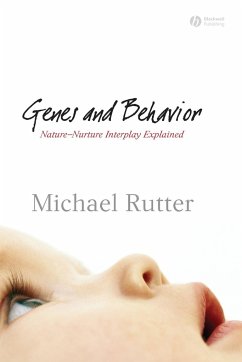In recent years, the subject of genes and their influence on human behavior has become increasingly controversial as concerns about the racist use of genetics, discriminatory eugenics, and neurogenetic determinism have grown. In this major new book, eminent scientist Professor Sir Michael Rutter gets behind the hype to provide a balanced and authoritative overview of the genetic revolution and its implications for understanding human behavior. Rutter sets out in layman's terms what genetic science has discovered to date, explaining exactly what genes do, how much is nature and how much is nurture. He argues that nature and nurture are not truly separate, giving powerful illustrations of how the two interact to determine our behavior. He also considers the implications of genetic findings for policy and practice. This thought-provoking account will inform public debate about the implications of the Human Genome Project and, more broadly, the field of genetic science.
Hinweis: Dieser Artikel kann nur an eine deutsche Lieferadresse ausgeliefert werden.
Hinweis: Dieser Artikel kann nur an eine deutsche Lieferadresse ausgeliefert werden.
"By carefully considering basic principles and illustrating them with cutting-edge examples, Rutter has written an excellent introduction to behavioral genetics." (The Quarterly Review of Biology, March 2009)
"When I came to read this book I anticipated the critical integration of evidence by one of the most resourceful scientists of our era. I was not let down." (Journal of Children's Services, December 2007)
"The question of how genes and the environment interact should be an area of interest to all social and physical science; it should not remain solely the domain of geneticists. For anyone interested in developing a greater understanding of the mechanics of this interaction, this book would make an excellent choice." (Young Minds Magazine, July 2006)
"Michael Rutter, the United Kingdom's gift to world psychiatric excellence deals with this issue head-on in an amazingly readable and highly accurate book about genes and behaviour. ... This book is a gem." (Psychological Medicine, 2006)
"If you want an inspiring contribution to the debate in this highly topical area or research and also want to learn about the most up-to-date approaches to genetic research, then this is the book to choose." (Nature, 2006)
"Rutter offers a highly critical and extremely clear and well-written review of the current state of the nature/nurture argument as it relates to human behaviour and psychiatric illness. ... It is written in a way that should be easily accessible to the general reader as well as to the specialist. And, since its subject matter affects all of us, it should be read widely." (Times Higher Education Supplement)
"The author deftly deals with the extreme arguments of genetic and environmental evangelists. It is a lucid, balanced tour de force. Highly recommended." (Journal of Clinical Psychiatry)"In this highly readable and intellectually honest book, the latestadvances in molecular and behavior genetics are brought to bear onour knowledge of psychology and psychiatry. The end product is aneloquent exposition of "genetic realism" in the contextof behavior, and will surely be of interest to all who are curiousabout the forces that give rise to human behavior, both normal andabnormal."
-Charles A. Nelson III, Harvard Medical School
"Genes and Behavior: Nature-Nurture InterplayExplained manages to be comprehensive, lucid, and clear,without oversimplifying what is an inherently complex subject. Itenables a clinician to understand the fundamentals of genetics asthey apply to medicine and a geneticist to understand theenvironmental determinants of the phenotype. What makes it entirelyremarkable is that it is comprehensible to generalists and yet hasmuch to teach specialists."
-Leon Eisenberg, Harvard Medical School
"No one but Michael Rutter could have written this remarkable,compelling book. At last we have a clear and balanced treatment ofthe role genes play in the variations among individuals inbehavioral traits and psychosocial pathologies. Rutter rescues thereader from the excesses of both the "evangelical" geneticists andthe environmental extremists. He draws on his vast knowledge of thepertinent theories and empirical work, and takes the reader beyondthe limited scope of statistical twin and adoption studies into therecent work of molecular geneticists, illuminating some of thecomplex biological processes that govern the ways in which geneticfactors can work or fail to work in influencing behavioraloutcomes, and how their effects can be modified by experience.Rutter presents a carefully reasoned case for co-action of geneticand environmental factors at all stages of development. A must-readfor anyone seriously interested in nature/nurture issues."
-Eleanor E. Maccoby, Stanford Center onAdolescence
"When I came to read this book I anticipated the critical integration of evidence by one of the most resourceful scientists of our era. I was not let down." (Journal of Children's Services, December 2007)
"The question of how genes and the environment interact should be an area of interest to all social and physical science; it should not remain solely the domain of geneticists. For anyone interested in developing a greater understanding of the mechanics of this interaction, this book would make an excellent choice." (Young Minds Magazine, July 2006)
"Michael Rutter, the United Kingdom's gift to world psychiatric excellence deals with this issue head-on in an amazingly readable and highly accurate book about genes and behaviour. ... This book is a gem." (Psychological Medicine, 2006)
"If you want an inspiring contribution to the debate in this highly topical area or research and also want to learn about the most up-to-date approaches to genetic research, then this is the book to choose." (Nature, 2006)
"Rutter offers a highly critical and extremely clear and well-written review of the current state of the nature/nurture argument as it relates to human behaviour and psychiatric illness. ... It is written in a way that should be easily accessible to the general reader as well as to the specialist. And, since its subject matter affects all of us, it should be read widely." (Times Higher Education Supplement)
"The author deftly deals with the extreme arguments of genetic and environmental evangelists. It is a lucid, balanced tour de force. Highly recommended." (Journal of Clinical Psychiatry)"In this highly readable and intellectually honest book, the latestadvances in molecular and behavior genetics are brought to bear onour knowledge of psychology and psychiatry. The end product is aneloquent exposition of "genetic realism" in the contextof behavior, and will surely be of interest to all who are curiousabout the forces that give rise to human behavior, both normal andabnormal."
-Charles A. Nelson III, Harvard Medical School
"Genes and Behavior: Nature-Nurture InterplayExplained manages to be comprehensive, lucid, and clear,without oversimplifying what is an inherently complex subject. Itenables a clinician to understand the fundamentals of genetics asthey apply to medicine and a geneticist to understand theenvironmental determinants of the phenotype. What makes it entirelyremarkable is that it is comprehensible to generalists and yet hasmuch to teach specialists."
-Leon Eisenberg, Harvard Medical School
"No one but Michael Rutter could have written this remarkable,compelling book. At last we have a clear and balanced treatment ofthe role genes play in the variations among individuals inbehavioral traits and psychosocial pathologies. Rutter rescues thereader from the excesses of both the "evangelical" geneticists andthe environmental extremists. He draws on his vast knowledge of thepertinent theories and empirical work, and takes the reader beyondthe limited scope of statistical twin and adoption studies into therecent work of molecular geneticists, illuminating some of thecomplex biological processes that govern the ways in which geneticfactors can work or fail to work in influencing behavioraloutcomes, and how their effects can be modified by experience.Rutter presents a carefully reasoned case for co-action of geneticand environmental factors at all stages of development. A must-readfor anyone seriously interested in nature/nurture issues."
-Eleanor E. Maccoby, Stanford Center onAdolescence








